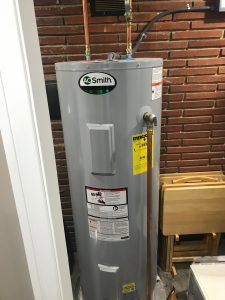Common Heater Issues And Solutions
Common Heater Issues And Solutions
Blog Article
This great article down below on the subject of Water Heaters Problems is exceedingly interesting. Try it and draw your own personal ideas.

Imagine beginning your day without your regular hot shower. That already establishes a poor tone for the remainder of your day.
Every residence requires a reputable hot water heater, yet just a few recognize how to take care of one. One easy method to keep your water heater in top shape is to check for mistakes routinely and repair them as quickly as they appear.
Remember to switch off your water heater before smelling around for mistakes. These are the water heater mistakes you are most likely to come across.
Water as well hot or as well cold
Every hot water heater has a thermostat that identifies just how hot the water obtains. If the water coming into your residence is too warm despite establishing a hassle-free maximum temperature level, your thermostat might be malfunctioning.
On the other hand, too cold water may result from a fallen short thermostat, a broken circuit, or inappropriate gas flow. For instance, if you use a gas water heater with a busted pilot light, you would obtain cold water, even if the thermostat remains in excellent condition. For electrical heating units, a blown fuse might be the perpetrator.
Not nearly enough warm water
Hot water heater come in many dimensions, depending on your warm water needs. If you lack hot water before every person has had a bath, your water heater is also little for your family size. You ought to think about mounting a bigger hot water heater tank or going with a tankless hot water heater, which occupies less space and also is more resilient.
Weird noises
There go to the very least 5 kinds of noises you can learn through a hot water heater, but one of the most common interpretation is that it's time for the water heater to retire.
To start with, you need to be familiar with the typical appears a water heater makes. An electrical heater might seem various from a gas-powered one.
Popping or banging sounds usually mean there is a slab of sediment in your tanks, and it's time to cleanse it out. On the other hand, whistling or hissing noises may just be your valves allowing some stress off.
Water leakages
Leakages can originate from pipes, water links, valves, or in the worst-case situation, the tank itself. With time, water will certainly rust the tank, and locate its way out. If this takes place, you need to change your water heater as soon as possible.
Nevertheless, before your adjustment your entire container, be sure that all pipelines are in area and that each valve functions flawlessly. If you still need aid determining a leakage, call your plumber.
Rust-colored water
Rust-colored water implies one of your hot water heater elements is corroded. It could be the anode pole, or the container itself. Your plumber will have the ability to recognize which it is.
Warm water
Despite exactly how high you established the thermostat, you won't obtain any hot water out of a heater well past its prime. A water heater's effectiveness might reduce with time.
You will certainly additionally get lukewarm water if your pipelines have a cross connection. This implies that when you activate a faucet, hot water from the heater flows in alongside routine, cold water. A cross connection is easy to place. If your hot water taps still run after closing the hot water heater shutoffs, you have a cross connection.
Discoloured Water
Rust is a significant reason for dirty or discoloured water. Rust within the water storage tank or a falling short anode pole might create this discolouration. The anode pole shields the container from rusting on the inside and also should be checked yearly. Without a rod or an appropriately operating anode rod, the warm water promptly rusts inside the storage tank. Get in touch with a specialist hot water heater specialist to identify if replacing the anode rod will certainly take care of the problem; if not, change your water heater.
Final thought
Ideally, your water heater can last 10 years prior to you need a modification. However, after the 10-year mark, you may experience any one of these faults a lot more on a regular basis. At this point, you should include a new hot water heater to your budget.
How To Troubleshoot 3 Common Water Heater Problems in Twin Cities
The Water Heater Is Leaking
A leaky cold water inlet valve A loose pipe fitting A leaky temperature and pressure relief valve A corroded anode rod A cracked tank Turn Off Your Water Heater:
Shut off your gas water heater by turning the gas valve on the unit to the “OFF” position. Shut off your electric water by switching its power off at your electrical panel. Look for a two-pole breaker labeled “water heater” and turn it to the “OFF” position. Move the ball valve connected to the water heater to be perpendicular to the piping at a 90° angle. Look for the Leak:
Depending on whether the water is coming from the tank's top or bottom, you’ll want to look for the leak in different locations.
If the leak comes from the top of the tank, carefully look for water escaping from the cold water inlet valve or loose pipe fittings. Rusted hot and cold water valves can have loose connections with the tank, with water leaking out of them.
https://mspplumbingheatingair.com/blog/how-to-troubleshoot-3-common-water-heater-problems
As a person who reads about Common Problems with Tank Water Heaters, I think sharing that piece of content was valuable. Are you aware of anybody else who is sincerely interested in the topic? Do not hesitate to promote it. We treasure reading our article about Water Heater Repair and Troubleshooting.
At This Website Report this page